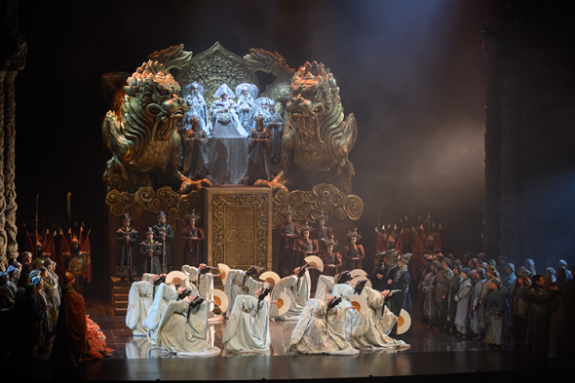 Spain Puccini, Turandot: Soloists, Liceu Chorus and Orchestra / Alondra de la Parra (conductor). Gran Teatre del Liceu, Barcelona, 28 & 29.11.2023. (JMI)
Spain Puccini, Turandot: Soloists, Liceu Chorus and Orchestra / Alondra de la Parra (conductor). Gran Teatre del Liceu, Barcelona, 28 & 29.11.2023. (JMI)

Production:
Director – Nuria Espert
Revival – Bárbara Lluch
Sets – Ezio Frigerio
Costumes – Franca Squarciapino
Lighting – Vinicio Cheli
Choreography – Marco Berriel
Cast:
Turandot – Elena Pankratova / Ekaterina Semenchuk
Calaf – Michael Fabiano / Martin Muehle
Liù – Vannina Santoni / Marta Matheu
Timur – Marco Mimica / Adam Palka
Altoum – Siegfried Jerusalem / Raúl Giménez
Ping – Manel Esteve
Pang – Moisés Marín
Pong – Antoni Lliteres
Mandarin – David Lagares
The Liceu has once again programmed this Nuria Espert production of Turandot which inaugurated the new theater in 1999, five years after a terrible fire had destroyed it. This is an opera that easily accommodates spectacular stagings, and that is the path chosen by Nuria Espert in the co-production with ABAO Bilboa Opera. The Act II sets are especially striking and belong to the category of those that prompt applause when the curtain rises.
There were positive and negative aspects to Espert’s plan. Among the former was the fact that the grandeur of the production did not impede the development of the characters’ inner drama. Espert wanted to make a point about the androphobia of the Ice Princess, and that was clear from her presentation of ‘In questa reggia’. The negative aspect was the decision to have Turandot commit suicide – it fits Espert’s vision but not the libretto, nor the explosion of joy at the end of the opera.
On this occasion, the staging was directed by Bárbara Lluch, Nuria Espert’s granddaughter. Her decision to eliminate the protagonist’s suicide seems much more appropriate.

The musical reading of conductor Alondra de la Parra was a bit irregular. There was an excess of decibels throughout, which is not of major importance in the many crowd scenes. But I was not convinced by her conducting in the more intimate scenes: the orchestra did not pause after ‘Nessun dorma’ or after Liù’s death. The Liceu Orchestra did well and so did the chorus, which on this occasion was accompanied by the Orfeó Catalá Children’s Choir.
In the first cast, Turandot was sung by soprano Elena Pankratova, who has a voice that is well-suited to the role’s demands. I have heard her sing the part on previous occasions, and this performance matched the earlier ones. Mezzo-soprano Ekaterina Semenchuk was Turandot in the second cast. I was reminded that this is a clearly soprano role, and that she is singing characters such as Abigail and Lady Macbeth this season. She was excellent, and I have the impression that there is a change in her voice. She did not sound like a mezzo at any point, covering the high notes perfectly and without clearly standing out noticeably in the lower ones.

Calaf in the first cast was tenor Michael Fabiano, who did not convince me. His voice is attractive, but he is limited in the upper part of the tessitura. This was evident at the end of the always-awaited ‘Nessun dorma’, and he avoided the optional high note of ‘Tutta ardente’. Tenor Martin Mühle was Calaf in the second cast. I had seen him a few months ago in this same character at the Teatro Real, and his performance this time was an improvement. His voice has quality, and the upper notes are bright. He is not an extraordinary Calaf but was better in the role than Fabiano.
Liù was soprano Vannina Santoni, whom I had only seen once before, ten years ago as Zerlina in Don Giovanni. She was a debutante then, and her voice had not matured. Now, her voice has developed nicely, and she gave a fine interpretation of the slave. In the second cast, Liù was sung by Marta Matheu, who has a good voice although her volume is not excessive.
Marco Mimica and his sonorous voice did well as Timur, better than Adam Palka in the other cast. The trio of masks, Ping, Pang and Pong, were covered correctly by Manel Esteve, Liù and Antoni Lliteres.
We heard two ‘old glories’ as Altoum: Siegfried Jerusalem and Raúl Giménez. They still have strong voices that carry, and they know how to sing. Finally, David Lagares offered a pleasing voice as Mandarin.
José M. Irurzun
